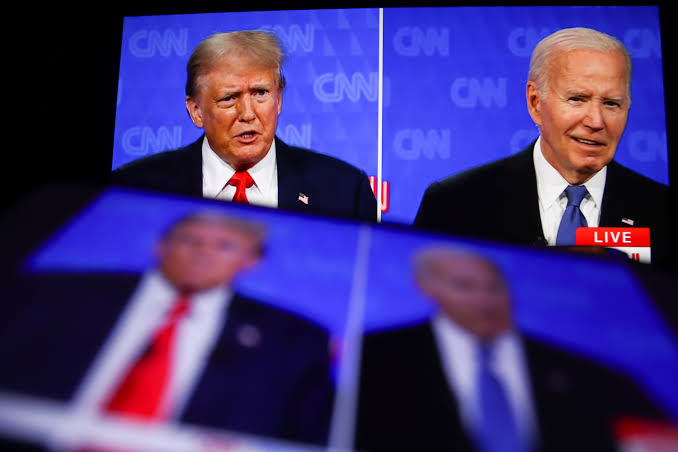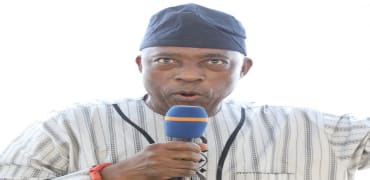The Weak and the Liar: A Tale of Two Presidents on the Road to 2024
The Weak and the Liar: A Tale of Two Presidents on the Road to 2024
*By Tayo Mabeweje*
As the 2024 American presidential election draws near, the political arena is shaped by two dominant figures: President Joe Biden and former President Donald Trump. Their contrasting styles and policies have ignited a fierce debate, with Biden's perceived weakness and Trump's notoriety for misinformation taking center stage.
President Biden, throughout his tenure, has struggled to effectively address critical issues like the economy and foreign policy. His leadership style is often criticized as being indecisive and lacking in vision, raising doubts about his ability to steer the country towards a stable future. This perceived weakness has not gone unnoticed by his political opponents and the electorate, who question his capacity to inspire confidence and lead decisively.
On the other hand, former President Trump's tenure and subsequent political campaigns have been marked by a persistent pattern of falsehoods and misinformation. Trump's political style, characterized by his aggressive and often divisive rhetoric, has polarized the nation. He continues to make unfounded claims and propagate conspiracy theories, many of which have been thoroughly debunked by fact-checkers and experts. This approach has not only eroded trust in political institutions but has also deepened the divide within the American populace.
The recent presidential debate highlighted these stark contrasts. Trump's assertiveness and relentless attacks on Biden's record were juxtaposed against Biden's struggle to present a clear and compelling vision. Trump's barrage of false claims overshadowed Biden's attempts to counter effectively, showcasing the challenges each candidate faces in appealing to voters.
The implications of this dynamic are profound. At a time when the country is grappling with significant challenges both domestically and internationally, the leadership styles of Biden and Trump are a microcosm of the broader polarization and dysfunction plaguing American politics. Biden's perceived weakness and Trump's divisive tactics present voters with a difficult choice, as each candidate's flaws highlight the broader issues facing the nation's political landscape.
The economic challenges facing the United States are particularly pressing. Under Biden's administration, efforts to address inflation, job creation, and economic inequality have faced criticism for being slow and ineffective. Biden's approach to these issues has been seen by many as cautious and lacking boldness, which has led to frustrations among those who demand more decisive action.
Conversely, Trump's economic policies during his tenure were marked by tax cuts and deregulation, which were popular among his base but criticized for benefiting the wealthy and increasing the national debt. Trump's promises of economic revival are tempered by his track record, which includes significant trade deficits and a contentious relationship with key economic partners.
Foreign policy is another arena where the contrast between Biden and Trump is stark. Biden's approach has emphasized rebuilding alliances and restoring America's position on the global stage. However, his administration's handling of the withdrawal from Afghanistan and other foreign policy challenges has been criticized as poorly executed and indicative of a broader lack of strategic foresight.
Trump's foreign policy was characterized by a more unilateral approach, often undermining traditional alliances and engaging in high-stakes diplomacy that yielded mixed results. His meetings with North Korean leader Kim Jong-un and the controversial decision to pull out of the Iran nuclear deal are examples of his unpredictable and often contentious foreign policy moves.
The debate over these issues is not just about policies but also about the underlying values and vision each candidate represents. Biden's emphasis on unity and restoring normalcy contrasts sharply with Trump's focus on populist rhetoric and "America First" policies. This dichotomy reflects deeper societal divides and differing visions for the future of the United States.
In the realm of healthcare, Biden's administration has made efforts to expand access and address the COVID-19 pandemic through vaccination campaigns and public health measures. However, criticisms regarding the handling of the pandemic and the ongoing challenges in the healthcare system persist, reflecting broader concerns about the effectiveness of his leadership.
Trump's approach to healthcare was dominated by attempts to repeal the Affordable Care Act, which faced significant opposition and ultimately failed. His handling of the COVID-19 pandemic, marked by misinformation and inconsistent messaging, has been a significant point of contention and a focal point for his critics.
Education is another critical issue where the two leaders' approaches differ significantly. Biden has advocated for increased funding for public education, student debt relief, and support for teachers. However, the execution of these policies has been met with mixed reactions, as challenges in implementation and opposition from political adversaries have hindered progress.
Trump's stance on education included promoting school choice and reducing federal oversight, which appealed to certain segments of the electorate but faced opposition from those who support public education funding and oversight. The debate over education policy reflects broader ideological differences and competing visions for the future of American education.
Environmental policy is another area where Biden and Trump stand on opposite ends of the spectrum. Biden's administration has prioritized addressing climate change, rejoining the Paris Agreement, and implementing policies aimed at reducing carbon emissions. However, these efforts have faced resistance from industries and political opponents who argue that they harm economic growth.
Trump's environmental policies were marked by deregulation and support for fossil fuel industries, which garnered support from certain sectors but faced criticism for neglecting the urgent need to address climate change. The environmental debate highlights the broader clash between economic interests and the imperative to address global environmental challenges.
The issue of immigration remains a contentious topic. Biden's administration has sought to implement more humane immigration policies, including reversing some of Trump's most controversial measures. However, challenges at the border and opposition from political adversaries have complicated these efforts, leading to criticism of Biden's handling of immigration.
Trump's immigration policies were characterized by a hardline approach, including building a border wall and implementing strict enforcement measures. These policies were popular among his base but faced significant opposition from those who viewed them as inhumane and counterproductive. The immigration debate underscores the broader conflict over national identity and the role of immigration in American society.
The contrasting styles and policies of Biden and Trump also extend to their approaches to social issues. Biden has championed policies aimed at addressing systemic racism, promoting LGBTQ+ rights, and advancing gender equality. However, the implementation of these policies has faced resistance and sparked intense debate, reflecting broader societal divides.
Trump's approach to social issues has been marked by a focus on traditional values and opposition to certain progressive policies. His stance on issues such as race relations, LGBTQ+ rights, and gender equality has been polarizing, appealing to certain segments of the electorate while alienating others. The debate over social issues highlights the broader cultural and ideological divisions within the country.
As the election approaches, the choice between Biden and Trump is not just a choice between two individuals, but a choice between two fundamentally different visions for the future of the United States. Biden's emphasis on unity, rebuilding alliances, and addressing systemic issues contrasts sharply with Trump's focus on populist rhetoric, unilateral action, and traditional values.
The future of American democracy hangs in the balance, as voters must carefully consider the implications of their choice. The road to 2024 is fraught with challenges and uncertainties, as the country grapples with economic, social, and political issues that will shape its future for years to come.
In conclusion, the tale of the weak and the liar presidents is a reflection of the broader polarization and dysfunction that has come to define American politics. As the election approaches, voters face a critical choice that will have significant implications for the future of the country. The contrasting styles and policies of Biden and Trump represent a microcosm of the broader societal divides and competing visions for the future of the United States.

















